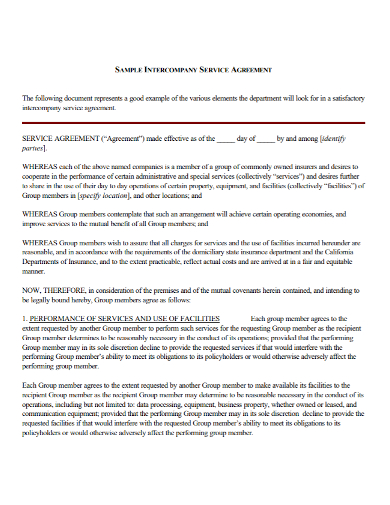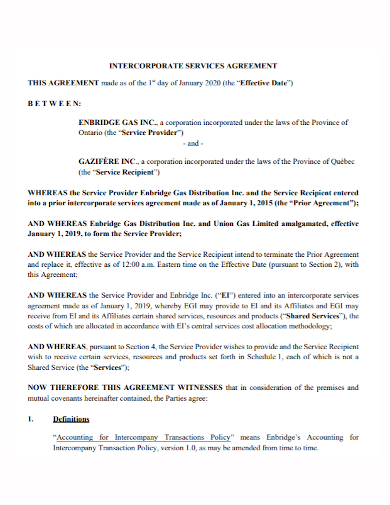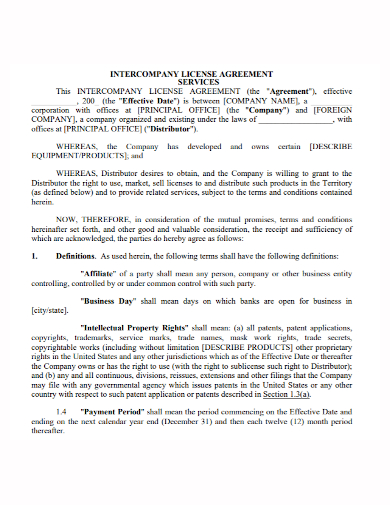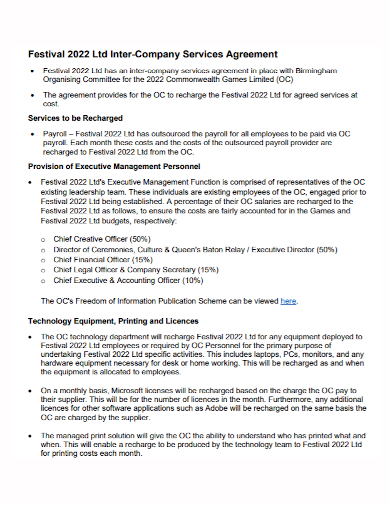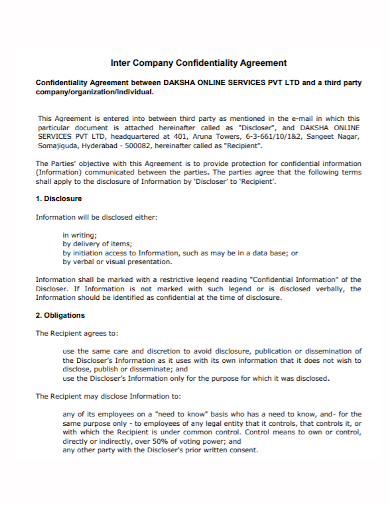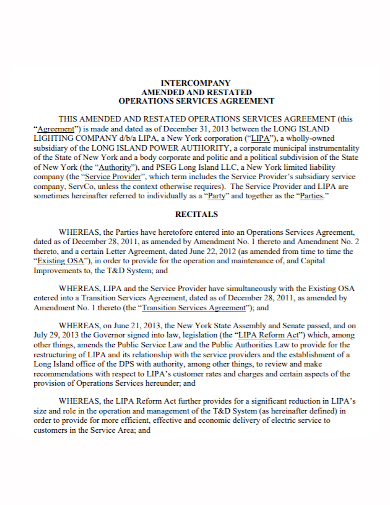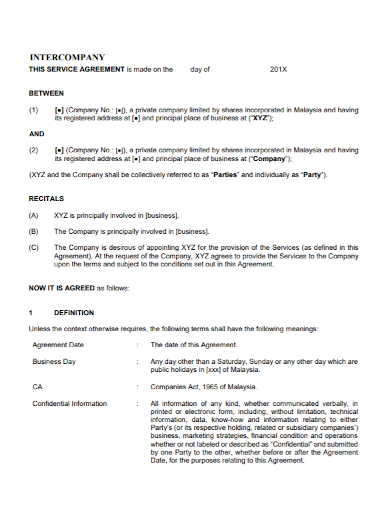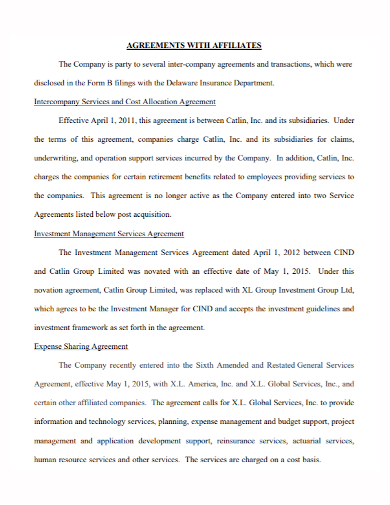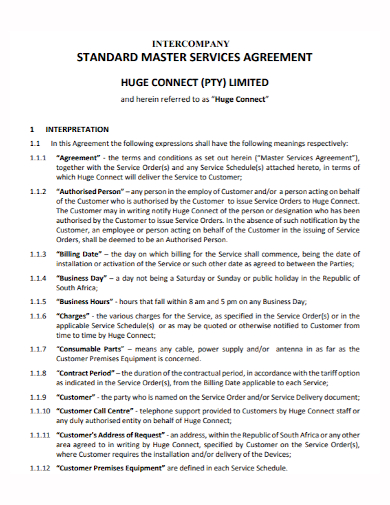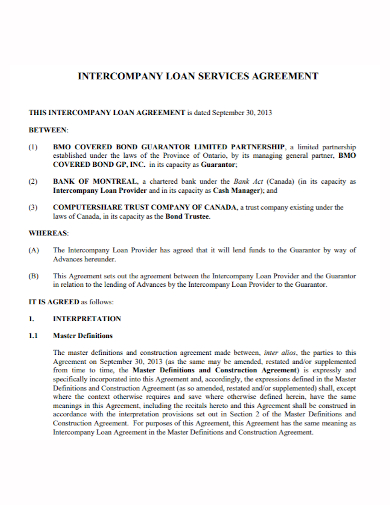An Intercompany Agreement (ICA) is a commercial agreement between companies that are related through ownership, common control, or membership in the same group of companies for services, the sale of goods, financing, or intangible property. Companies enter into ICAs for a variety of reasons, including operational, strategic IP, tax, and legal. A holding company, for example, may own shares in subsidiaries but not engage in active business operations or employ people. As a result, the holding company may enter into an ICA for administrative services with another company in the same group.
10+ Inter-Company Services Agreement Samples
Intercompany agreements are contracts made among two or more businesses or divisions owned by the same parent company. It is a contract that refers to the internal transactions of sales or transfers of goods and services between the businesses. The reason for an intercompany agreement is to deal with certain factors of the parent company with the cooperation of both divisions of the same corporation.
1. Inter-Company Services Agreement Template
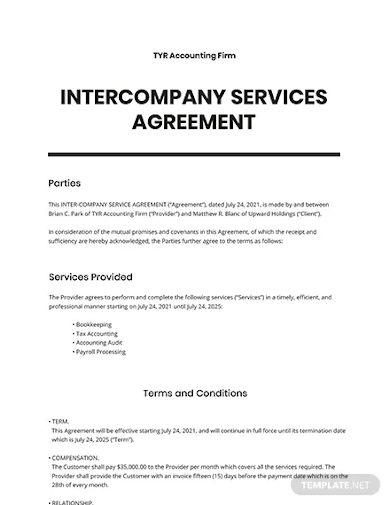
2. Inter-Company Services Agreement
3. Inter-Company Corporate Services Agreement
4. Inter-Company License Services Agreement
5. Festival Inter-Company Services Agreement
6. Inter-Company Services Confidentiality Agreement
7. Inter-Company Operations Services Agreement
8. Sample Inter-Company Services Agreement
9. Inter-Company Services Cost Allocation Agreement
10. Inter-Company Master Services Agreement
11. Inter-Company Loan Services Agreement
Purpose
Companies are unable to profit from intercompany transactions. As a result, businesses or divisions of a parent company are required to report intercompany transactions using a specific method. Intercompany agreements are used to define how transfers take place and to determine what actions are required for all parties involved based on the financial results.
Benefits
Intercompany agreements benefit corporations with multiple divisions because they allow goods and services to be transferred to a location within the corporation that will benefit the most from them without incurring negative tax consequences. They can also help the corporation and its businesses interpret and analyze inventory and sales data more effectively by separating goods and service transfers caused by intercompany agreements resulting from other transactions.
Tips for Creating Inter-Company Services Agreements
- Recitals can be used to your advantage. Recitals can explain a taxpayer’s position in simple terms, even if they aren’t part of the legal agreement. Make it known in a recital, for example, if a distribution plan is known to be low risk. If certain aspects of history are necessary for understanding and agreement’s intent, include them in a recital.
- Make sure that the contract language makes the intended subject matter of the agreement clear. If a taxpayer is attempting to establish a limited-risk arrangement, for example, substantial supplies in the agreement should reduce or eliminate a party’s risks, such as clarifying which merchandise poses certain risks and which costs can be reimbursed. To get a limited-risk arrangement, simply providing an adjusted, lower operating margin or using a cost-plus pricing transfer method is highly unlikely without giving more, for a benefit.
A cross-discipline approach is best for drafting an intercompany agreement. Tax and finance professionals prepare transfer pricing documentation, but they may lack legal document preparation skills. Similarly, most legal professionals are unaware of transfer pricing regulations. As a result, it’s critical to have the right people and skills on board.
FAQs
What should be included in intercompany agreements?
The nature of the controlled transaction and the jurisdictions in which the controlled transaction(s) takes place determine the content of intercompany agreements. Complex controlled transactions, such as intellectual property licensing, necessitate detailed contracts. Simple contracts for controlled transactions, such as the provision of management services, can be used.
Having said that, every intercompany contract must include the following basic requirements:
- Parties
- Considerations
- A transaction that is under control
- Remuneration at arm’s length
- Term
- Taxes
- Amendments
- Jurisdiction and governing law
Do Inter-company Service Agreements differ from other commercial agreements?
ICAs are similar to commercial agreements between unrelated parties, though companies within a group will try to keep them much shorter and lighter to ensure that stakeholders in both inbound and outbound companies spend as little time as possible complying with and interpreting terms.
ICAs, on the other hand, differ from other commercial agreements in that they are typically set up with the goal of maximizing a group’s overall profits, lowering costs, increasing earnings, or all of the above. The agreement can be made as they see fit because it is between related companies. ICAs are frequently audited and scrutinized for compliance with tax transfer pricing and other regulations due to their discretionary nature.
If you want to see more samples and formats, check out some inter-company service agreements samples and templates provided in the article for your reference.
Related Posts
FREE 10+ Mentoring Agreement Samples In MS Word | Apple Pages | PDF
FREE 10+ Partner Agreement Samples In MS Word | Google Docs | Apple Pages | PDF
FREE 10+ Individual Agreement Samples In MS Word | Google Docs | Apple Pages | PDF
FREE 10+ Strategic Agreement Samples In MS Word | Google Docs | Apple Pages | PDF
FREE 10+ Equity Agreement Samples In MS Word | Google Docs | Apple Pages | PDF
FREE 10+ Producer Agreement Samples in MS Word | Apple Pages | PDF
FREE 10+ Grant Agreement Samples In MS Word | Apple Pages | PDF
FREE 8+ Meeting Agreement Samples in MS Word | Google Docs | Apple Pages | PDF
FREE 10+ Community Agreement Samples In MS Word | Google Docs | PDF
FREE 8+ Real Estate Option Agreement Samples in MS Word | PDF
FREE 10+ Call Option Agreement Samples In MS Word | PDF
FREE 10+ Advertising Agreement Samples In MS Word | Google Docs | Apple Pages | PDF
FREE 10+ Car Agreement Samples In MS Word | Google Docs | Apple Pages | PDF
FREE 10+ Horse Agreement Samples In MS Word | Apple Pages | PDF
FREE 10+ Option Agreement Samples In MS Word | Google Docs | Apple Pages | PDF

